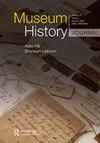From Berlin to Belém: Theodor Koch-Grünberg’s Rio Negro collections
IF 0.2
Q3 HISTORY
引用次数: 1
Abstract
ABSTRACT During his expedition to the rivers Rio Negro and Japurá between 1903 and 1905, the German ethnologist Theodor Koch-Grünberg amassed an ethnographic collection. Part of it he sold to the Royal Museum of Ethnology in Berlin and a smaller part was purchased by the Swiss naturalist Emílio Goeldi for the Museu Paraense in Belém, in northern Brazil. A number of aspects arise from this singular transaction: research funding (including institutional and personal relations) at the beginning of the institutionalisation of anthropology; the importance of German speaking intellectuals to the development of natural sciences and ethnography of Brazil; the social and economic importance of collecting and the complexity of local political relations. The aim of this article is to analyze the social context in which this collection was formed, with special attention to the indigenous agency and social relations around material culture. It seeks to contribute to the history of collections, the history of science in Brazil and of the transatlantic relations between Brazilian museums and German ethnology.从柏林到柏林:Theodor koch - grnberg的里约热内卢黑人系列
摘要1903年至1905年间,德国民族学家西奥多·科赫·格伦伯格(Theodor Koch Grünberg)在考察内格罗河(Rio Negro)和雅普拉河(Japurá)期间,积累了一批民族志藏品。其中一部分被他卖给了柏林的皇家民族学博物馆,另一小部分被瑞士博物学家埃米利奥·戈尔迪为巴西北部贝伦的Paraense博物馆购买。这一单一交易产生了许多方面:人类学制度化初期的研究资金(包括机构和个人关系);讲德语的知识分子对巴西自然科学和民族志发展的重要性;收藏的社会和经济重要性以及地方政治关系的复杂性。本文的目的是分析这部作品集形成的社会背景,特别关注围绕物质文化的土著机构和社会关系。它试图为收藏史、巴西科学史以及巴西博物馆与德国民族学之间的跨大西洋关系做出贡献。
本文章由计算机程序翻译,如有差异,请以英文原文为准。
求助全文
约1分钟内获得全文
求助全文

 求助内容:
求助内容: 应助结果提醒方式:
应助结果提醒方式:


